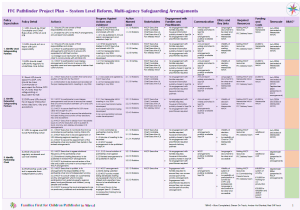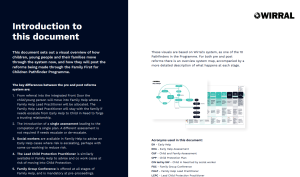FFC MASA and Systems
Introduction
Delivering an effective system of help and protection for children and their families is a multi-agency endeavour. We want to create greater consistency and accountability across all multi-agency safeguarding arrangements, so that leaders at the right level are making the right decisions for local children and families.
Our ambition, through the pathfinder and in line with Working Together, is to establish clear, equitable and shared safeguarding arrangements, embed a clear line of sight between strategy and practice and – given the key role they play in children’s lives – test a greater strategic role for education providers.
Key Features
- Establish a system-wide, ‘families first’ culture, which addresses structural inequalities, attends to the full spectrum of families’ contexts and needs, and facilitates a welcoming and effective system for children and families.
- Clarify and strengthen multi-agency safeguarding arrangements (MASAs), ways of working and independent scrutiny. This includes strengthening the role of education in MASA at strategic level.
- Streamline and support effective multi-agency information sharing and case management systems.
The Approach in Wirral
The Wirral Safeguarding Children Partnership led this part of the Pathfinder programme and established three workstreams: ensuring compliance with Working Together 2023 (WT23); establishing a central strategic role for education; ensuring the children’s services case management system supported the reforms
Compliance with WT23
The WSCP audited the current WSCP arrangements against the requirements of WT23 with a focus on the new roles of Delegated and Lead Safeguarding Partners, and the establishment of a Partnership Chair. To achieve this the following actions were taken:
- identification of the DSPs for the LA, Health and Police. These were drawn from the current leads for those statutory partners. These were identified as the DCS for the LA, the Lead Nurse for the ICB, and the borough police Superintendent
- identification of the partnership chair. The WSCP agreed to rotate this role on an annual basis amongst the DSPs subject to agreement by the LSPs. This was subsequently agreed and the DCS was named as the first partnership chair
- reshaping of the WSCP Executive which was reduced in size to only include the DSPs and the WSCP Business Manager
- identification of LSPs for the statutory partners. This was completed on a sub regional Merseyside footprint (this area includes 5 LA’s, one police force and one ICB. It was agreed the LSPs would be the five LA Chief Executives, the Merseyside police Chief Constable and the Cheshire and Merseyside ICB Chief Executive. A cycle of meetings was established to provide the LSPs with training about their role and to give them an opportunity to come together with the DSPs for the five boroughs
- the WSCP commissioned independent scrutiny of the renewed arrangements to ensure compliance with WT23
- an updated partnership arrangement document was published:
- With the new smaller Executive arrangement in place the WSCP is now establishing a larger multi-agency ‘board’ to sit between the Executive and the WSCPs committees and work groups. The board will allow wider participation in strategic oversight and the holding each other to account ethos of the partnership, whilst allowing the Executive to set the strategic direction and to be the accountable body to the LSPs.
Strategic Role for Education
A key part of the reforms being tested in Wirral is the establishment of Education as the fourth statutory safeguarding partner, with its own DSP and LSP. Whilst it will not be statutory for LA’s to have a DSP for education or for it to be a statutory partner, LA’s will need to ensure that education as a sector has a strategic role in their safeguarding arrangements. Therefore, there is likely to be learning for other LA’s from our experience.
Activity in Wirral to achieve this included:
- Agreeing the definition of ‘education’ in terms of membership of the sector. It was agreed this would include the early years sector, all schools regardless of status, all post 16 colleges and providers, including alternative provision. It was important to establish this when considering representation
- In Wirral we agreed to create a full-time fixed term DSP for Education post for the duration of the Pathfinder to maximise capacity to deliver the reforms in a relatively short space of time. The post was advertised across the education sector, and we subsequently appointed a senior member of staff from one of our secondary schools into the role
- The WSCP established a ‘safeguarding in education’ committee, chaired by the DSP for education (who also sat with the other DSPs as a member of the WSCP Executive to ensure parity with the other three statutory partners), and with membership drawn from across the sector
- A terms of reference for the DSP role was created:
- The DSP for Education and the Education Committee established a workplan with priorities for the following 12 months. These included work streams to benefit the entire sector such as a participation strategy and an approach for safeguarding supervision
- The DSP for Education also represents the sector on other groups and committees, providing a voice for the whole economy which was previously lacking
- Since the Pathfinder in Wirral has been extended for another year, the DSP for Education has also assumed a role to support the NW region in developing a coordinated approach to education as a strategic partner in safeguarding arrangements
- A key piece of work for 25-26 is to establish and test an LSP role for Education. As this work develops, updates will be provided here.
Case Management System
In common with many LA’s Wirral used the Liquid Logic system for children’s services case management. This system includes a module for statutory children’s social care, and a module for early help. The modules reflect the different organisation of children’s social care and early help, and how children’s social care, as a statutory service led by social workers is separated from early help led by LA and multi-agency alternatively qualified staff. However, the development of a Family Help approach encompassing both early help and children’s social care – with alternatively qualified professionals able to lead S17 Child in Need cases, requires a system where movement between the different modules is easy, or there is only one module.
Wirral has engaged with Liquid Logic since the beginning of Pathfinder to look at options for maximising the functionality of our current system, and to inform Liquid Logic about future developments and products they may wish to develop to efficiently support a Family Help approach.
Regardless of which CMS provider LAs use, we would suggest holding an early conversation with them, specifically about Family Help to ensure your current system is optimised to support you – including access into the system from partners.
Summary Presentation
to be added
Experiences of Professionals
to be added
Things we found Helpful
- Testing our current published MASA arrangements against WT23, and using independent scrutiny to identify required change
- Creating a DSP for Education role and recruiting directly from the education sector
- Mapping the current journey of a child and family through our system and thresholds and illustrating what it should look like post reform – se we knew what we were striving for
- Engaging with our systems provider (LiquidLogic)
- Recruiting a systems officer and comms officer
Our Top Tips for Embedding the FFC Partnership Programme (MASA and Systems)
- Identify your recruitment needs early as getting staff in place can be a lengthy process
- Ensure multi-agency and elected member support – engage with your MASA
- Have dedicated project management support
- Engage your third sector – they are a big resource
- Brief and reassure staff – any system change can be difficult, keep an open dialogue with staff
- Hold events, workshops, briefings, meetings. Co-produce, consult, and keep an open dialogue
- Map your pre and post journey of the child and family
- Have a clear plan….and keep what works!
Local Resources
Project Action Plan – MASA
System Change Map
This document shows the pre and post Pathfinder systems in Wirral.
Job Roles
Pathfinder Roles – Wirral Safeguarding Children Partnership
Role of DSP for Education
National Resources
The families first partnership programme guide
Children’s social care national framework
An illustrated guide to the Children’s Social Care National Framework
Children’s Wellbeing and Schools Bill – Parliamentary Bills – UK Parliament
Keeping children safe in education 2024
Inspecting local authority children’s services – GOV.UK
Return to FFC Homepage





